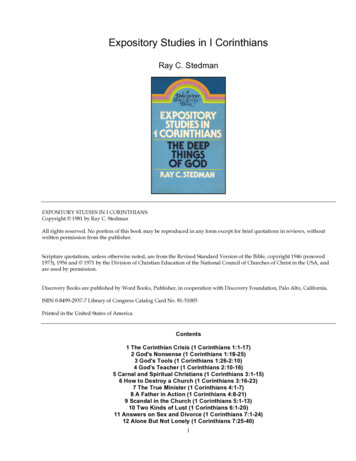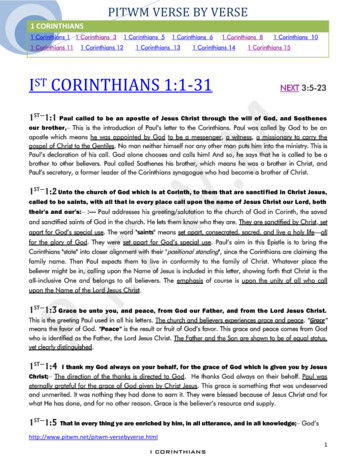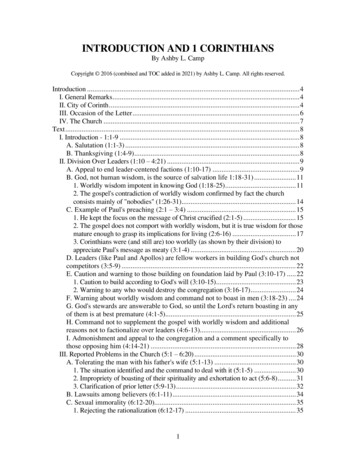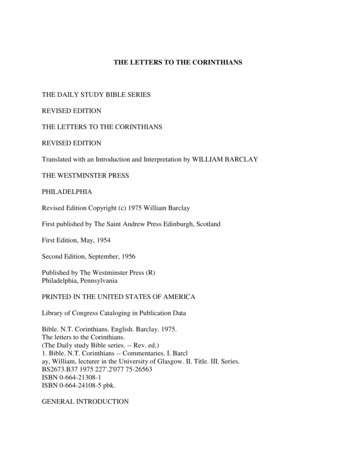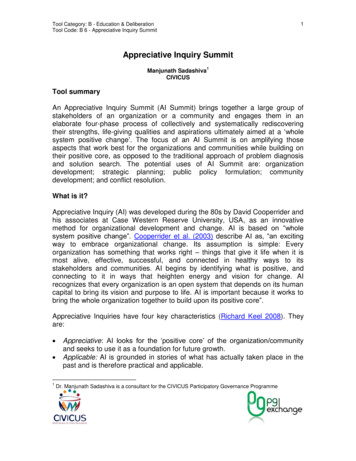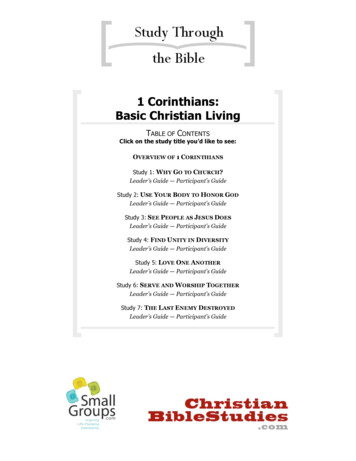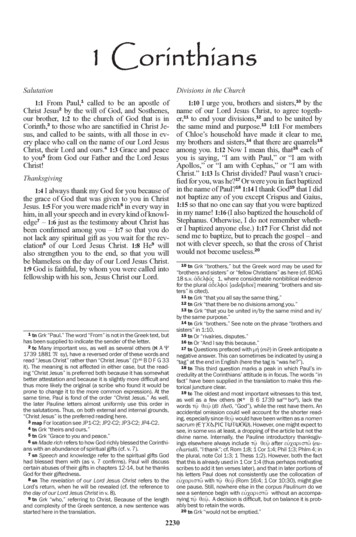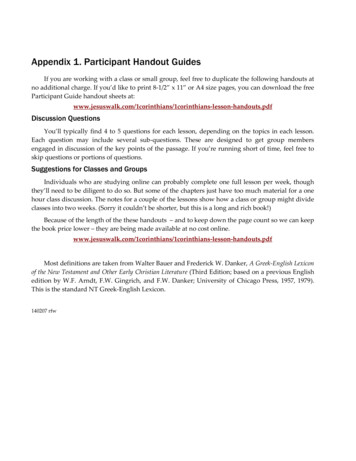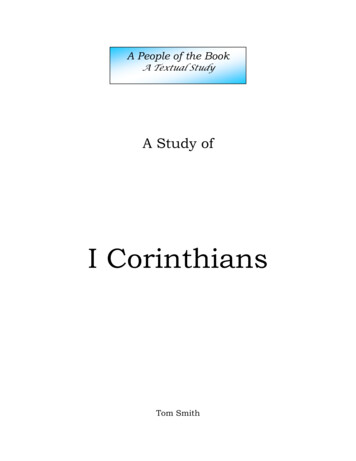
Transcription
A People of the BookA Textual StudyA Study ofI CorinthiansTom Smith
Studies in 1 CorinthiansLesson # 1Introduction & GreetingIntroduction1. Written by the Apostle Paul on 3rd missionary journey – probably AD 54-56a. 1 Cor.16:8 – said would tarry in Ephesus until Pentecost (written in Ephesus)b. When Paul in Corinth Gallio was deputy of Achaia – Acts 18:12c. History says - Gallio entered this office in AD 51d. Paul left Corinth soon after this – Acts 18:18e. After leaving he traveled to Ephesus, Caesarea, and Jerusalem & Antioch.f. From there he starts his 3rd missionary journey & comes to Ephesus2. Purpose of writinga. Draw the church together in unity – extremely fracturedb. Deal with moral laxityc. Answer certain question raised by the church at Corinth3. Foundational facts about servants of God – 1:1-3a. Called by the will of God1) Jn.15:16 – you did not choose Me, but I chose you2) 2 Cor.5:20 – we are ambassadors of Christb. A brother to other believers1) Because Paul was an Apostle made him no better than other believers2) He was to be respected as an Apostle (special messenger)3) Rom.12:3 – not to think more highly of self than ought4) Phil.2:3,4 – nothing be done through vain gloryc. Local church1) It is the church of Goda) Acts 20:28 – feed the church of Godb) The church belongs to God, not any man or group of peoplec) The church exists to do the will of God not man2) The church (believers) are those set apart & are called saintsa) Believers are called to be different from the worldb) Their lifestyle & purpose is different from the world – Rom.12:2c) 2 Cor.6:17,18 – come out from among themd) 1 Pet.1:14,15 – be holy in all manner of lifee) SaintsEph.4:24 – put on the new man created in righteousness2 Cor.5:17 – any one in Christ is a new creation3) All are brothers – no caste system – none greater than othersa) Super spirituality & pride have no place in the church(Only God to be honored & exalted)b) Christ is Lord & all believers are brothersc) Acts 10:34 – God is no respecter of personsd) Rom.14:4 – who are you to judge another man’s servant
2Paul’s Greetings1. Notice – Paul mentions Jesus Christ 10 times in 1st 10 versesa. Paul’s goal is for them to exalt Jesus – focus upon Him – 1 Cor.2:1-4b. With Jesus as their central focus all other matters will take care of selvesc. See also – Heb.12:1,2; 2 Cor.4:16-182. Believers were enriched in every waya. In speaking & knowledge – able to know & understand truth & make it knownb. Paul’s testimony about Christ was confirmed in them (evidence they believed)c. They lacked no spiritual gift – Eph.1:3ff3. The believer’s assurancea. Jesus will keep us strong unto the end1) Phil.1:6 – confident He will finish what started2) 2 Tim.1:12 – persuaded He is able to keep that which I have committed3) 1 Pet.1:5 – who are kept by the power of God4) Jude 24 – able to keep you from falling5) Rev.3:10 – I will keep you from the hour of temptationb. Called into the fellowship of God’s Son Jesus1) Rom.8:15-17 – received a spirit of adoption2) Rom.8:29 – predestined to be conformed unto His image3) Gal.4:4-6 – because are sons – sent Spirit of His Son into hearts4) Rev.3:20 – I stand at door & knock hear voice open, I will come in
1 Corinthians StudyLesson # 2A Divided ChurchIntroductionOne thing that stands out as you read the book of 1 Corinthians is the division thatwas rampant among the believers. Their fellowship was so deteriorated that the churchwas about to crumble & collapse. Severe dissention & division can be clearly seen;verbal accusations, competition, power struggles, envy, grumbling, murmuring,quarrelling, & gossiping etc. Disaster was threatening & a severe split was clearly uponthe horizon. In chapters one through four Paul deals with this problem & provides severalsolutions to the problem of division among believers.1 Cor.1:10-171. Paul’s approacha. Not judgmentally or with a spirit of rebuke or even fight in his heartb. “I appeal to you” KJV “I beseech you”1) Means – I call you to my side; let’s share together; talk this matter over2) Paul is pleading & begging them to hear what he has to sayc. Twice in these verses he refers to them as brothersd. He begs them in the name of Jesus to listen & heed his words1) For the sake of Jesus they must be united2) He wants them to remember their love for the Lord Jesus – His causee. Important how we approach those who are causing division in the church1) A spirit of tenderness & love must always be manifesteda) Mt.5:7 – blessed are the merciful receive mercyb) Prov.15:1 – gentle answer turns away anger; harsh words stir upc) Mk.11:25 – as pray forgive offenderd) Mt.18:15-17 – ought against another go privately2) Jesus’ examplea) Lk.5:27-32 – ate & drank with sinners to win themb) Acts 10:34-38 – God not show favoritism; He is Lord of allc) Mt.5:43-47 – love enemies so be sons of Father in heaven3) Other versesa) Gal.6:1- restore them gentlyb) 2 Tim.2:24-26 – must not quarrel; be kind not resentful2. Paul’s admonition – must be onea. Strong & straightforward wants no misunderstandingsb. Agree – reach agreement; quit talking against one another1) Stop the accusing, the attacks2) Stop the grumbling, the gossip, the slander & murmuring etc3) Stop allowing the tongue to divide & destroya) James 3:5-18 – tongue is a fire, a world or evilb) James 4:11 – don’t speak evil of anotherc) 1 Pet.2:1 – get rid of all slander
2d) 1 Pet.3:10- love life & see good days keep tongue from evile) Prov.13:3 – keep mouth keep lifef) Prov.21:23 – guard mouth keep out of troublec. Allow no division among you1) Division splits, tearing apart2) A divisive church is useless to God.3) Division is sinful & devastating to God’s kingdoma) Lk.11:17 – house divided against itself cannot standb) 1 Cor.3:3 – envy, strife & division are of men not Godc) James 3:13-16 – is of the devild. Goal – be perfectly joined together in mind & thought1) Greek word picture torn net repaired & mended; broken &dislocated limb restored to its proper place.2) In both mind & thought (KJV mind & judgment)a) Speaks of motivations, affections & intentionsb) Also conclusions, purposes, goals & objectives3) Eph.4:3 – endeavoring to keep the unity of the spirit4) Phil.1:27 – stand fast in one spirit, with one mind striving together5) 1 Pet.3:8 – live in harmony together3. The report of their divisiona. Paul not identify who; just the household – some might attack themb. Problem1) Quarrels wrangling, strife, faction2) Church was arguing & splitting into groups – cliques3) Church was allowing the flesh to rule – Eph.5:19-21c. Exalting former ministers1) Exalting preaching ability & stylea) Apollos was eloquent & mighty in the scriptures – Acts 18:24b) Paul was not a great orator – 2 Cor.10:10; 11:62) Failed to see God’s gifting & callinga) Paul excelled in establishing churches & strengthening believersb) Peter’s ministry was to the Jews more tradition & ritual3) Considered themselves mature & privileged spirituallya) Passed judgment on othersb) Usurped God’s authority as judge – James 4:124. Division is never righta. Three questions1) Is Christ divided?a) Division dethrones Christ – divider always thinks they are right(1) Sets self as Lord – person able to judge right & wrong(2) Feels Christ would hold their position – agree with themb) Jesus can’t be divided – only one Lord – Eph.1:22; Col.1:18
32) Was Paul crucified for you?a) Division exalts men not Jesusb) Believers don’t owe their allegiance to preachers or leadersc) 1 Cor.4:6 – not think of men above scripturesd) Gal.1:7-9 – preach another gospel anathema3) Were you baptized into the name of Paul?a) Baptism is in the name of Jesus; not a man or a churchb) It is a commitment of our life to the Lord Jesusc) To exalt a man is to violate that commitment to Jesusb. Note – Paul is adamant, he never tried to secure a personal following1) Baptized only Crispus & Gaiusa) Crispus leading ruler of synagogue – Acts 18:8b) Gaius – Paul’s host at Corinth – Rom.16:232) Sent to preach not to baptizea) Central focus was to be his messageb) Not matter who does the baptizingc) Ministers need to be careful to not allow other things to takethem from their primary responsibility – study, prayer &the sharing of the message of Jesus(1) Acts 6:3,4(2) 2 Tim.2:153) Christ is to be exalted – His words, His works; not mena) 1 Cor.2:1-5b) Rom.1:15,16
1 Corinthians StudyLesson # 3Paul’s 1st Answer To Division – The CrossIntroductionThe church at Corinth had allowed division to dominate them. They werefractured because of their focus upon & exaltation of man. Paul is adamant; they mustbecome one, being perfectly united in mind & thought. Salvation has come through Jesus& He must be the one who is exalted, not men. In this lesson we will focus on Paul’s 1stanswer to division – the cross.1 Corinthians 1:17-251. The primary mission of the preacher – preach the gospela. The cross the message of the gospel – 1 Cor.15:1-51) Demonstrates the love God has for man2) Everything else hinges what Jesus accomplished at the cross3) God reconciled man to Himself at the cross – 2 Cor.5:21b. One who speaks for God can empty the cross of its power1) When their focus is the wisdom of wordsa) Being eloquent or concerned with flowery speechb) Emphasis is persuasive words & enticing argumentsc) Interest is charisma or appearance – being politically correctd) Attention is placed upon the proclaimer not the message2) Preachers task is not to impress people with his charm, eloquence orvast wisdom – it’s to proclaim Jesus3) Lives change because of Jesus & what He did on the crossc. 1 Cor.2:1-5 – Paul’s attitude2. Cross is the power of God unto salvationa. Notice sharp contrast between words of wisdom & the message of the cross1) Words of wisdom plurala) Hints at differences & divisionsb) Offers many ways to find truth & the meaning of life2) Message of the cross – singular (one-way)b. Message of cross is foolishness to those who are perishing1) Perishing continuous actiona) Suggests that man is not static or sitting stillb) Either moving toward God or moving toward destruction2) Perishing means - lost; to be utterly destroyed; one that has no hopea) One facing condemnation & separationb) To be separated from God is to be in torment eternally3) Foolishness silliness, absurditya) So ridiculous will not even consider itb) Jews saw the cross as a curse – Deut.21:22,23
2c. Message of the cross is the power of God unto salvation1) Rom.1:16,172) No other message can change lives3) Called to take up cross & follow Jesusa) Mt.10:38,39; Lk.14:26,27 – more important than familyb) Mt.16:24,25 – more important than selfc) Lk.17:33 – more important than the worldd) Jn.12:24,25 – must willingly die to be fruitful3. Cross - makes the wisdom of the world foolishnessa. Quotes Isa.29:14; 33:18 – God speaking to the spiritually ignorantb. Exposes the fallacy on man’s reasoning1) Man seeks to gain life through the pursuit of science, technology & thereligion of human effort2) Uses what is at his disposal to conquer nature, disease, suffering,corruption & death (as if he has the ability)3) Man wants life on his terms – so he can do, as he desires4) Result – man could never find God1) Chose to find him in idols – Rom.12) Gave into the cravings of the flesh – became reprobate – Rom.13) Have only a form of godliness but no power – 2 Tim.3:1-8c. Cross - shatters all such reasoning1) Man can do nothing about his lost condition – hopelessly lost2) No amount of pursuing wisdom, science or religion can help3) God had to intervene – provide a way4) Now man must accept God’s answer – answer in God not mand. All real & lasting happiness & hope come through the message of the cross1) Through love & sacrifice man finds life’s answers2) Jesus demonstrated that, as He became sin’s offering3) Abundant & eternal life comes only through the message of the cross4. Never come to know God through the world’s wisdoma. Pursuing Him through science, technology & religion of human effort1) No matter what he does – he can never become perfect2) In spite of all that he achieves – he still falls short3) Illustration – jump a hundred foot chasmb. World makes two mistakes when they look at the cross – foolishness1) Jews see selves as the chosen – by being religious they are acceptableRom.10:1-42) Greeks admired wisdom & flowery words – cross is too simpleActs 17:16-21c. Through the message of the cross –only hope of men1) Calls men to surrender all he has & all that he is to Jesus2) Gal.2:20 – crucified with Christ – yet I live (not I but Christ in me)3) Acts 4:12 – salvation is found in no one else (nothing else either)
3d. Man wants signs & wisdom – always comes up short1) Jews wanted signs – Mt.12:38; 16:1; Mk.8:11,12; Lk.11:14-16;Jn.2:18; 6:30,312) Fallacy – Satan gives signs too – Pharaoh’s magicians; 2 Thess.2:9-12e. Flesh will always fail us – foolish to depend upon it1) In the flesh we are dead to God – Eph.2:1-3; Col.2:132) In the flesh we are powerless to fulfill God’s will – Rom.8:3,5-83) Gal.3:1-5 – some Christians foolishly exalt own works in vain5. Because the cross of Jesus is only way man can be saved – don’t exalt mena. Salvation is of God; not menb. Following & exalting men is foolishness – can’t savec. Jesus must be one exalted in life – only hope
1 Corinthians StudyLesson # 4Pride & Self-Sufficiency Are WrongIntroductionAs the Corinthian church struggled with the exaltation of men, Paul makes itabundantly clear that such actions & thinking are not of God. Christ is not divided nor isit His will that we exalt men & divide among ourselves. A vital principle is revealed –pride & self-sufficiency have no place in the church. The world elevates the wise, thepowerful & the noble. Yet as you examine those who answer God’s call, not many ofthese respond. Therefore there is no reason for snobbery, criticism & ignoring others. Weare only what God has made us & such things do not secure us any special treatment.1 Corinthians 1:26-311. Look at the type of people who respond to God’s calla. Not many wise – educator, teacher, philosopher, politician1) Those who seek (focus on) the wisdom of the world2) Man does not discover God by pursuing the wisdom of the worldb. Not many influential – powerful & wealthy rulers & business leaders1) Those who control the wealth & authority in the world2) Their trust & focus is in having & keeping wealth & powerc. Not many of noble birth – upper class; well born; those of respected heritage1) Those considered high-bred or the nobility of society2) Ones man considers great because of family heritaged. Having knowledge, influence & nobility often hinders one in accepting Jesus1) Although esteemed by man, they often get in the way of obeying God2) Such people have a tendency to think they are above others3) Often they feel their background ought to put them in better standingwith God than the average person.4) God is not impressed with pride, self-sufficiency, self-attainment &self-righteousness.e. Scriptures1) Rom.12:162) 1 Cor.8:23) Prov.3:74) Prov.26:125) Prov.28:266) Gal.6:3f. Thoughts1) Paul possibly went over the membership of the Corinthian church in hismind as he wrote verse 26.a) He reminded them that they had very few who were famous,wealthy, highly educated, powerful, or influential whenthey believed in the Lord.b) It is likely that, when they became Christians, they lost a greatdeal of the prestige, influence, and income they did have.
22) God is not looking for Phi Beta Kappa’s to save and to do His work.Nor is He looking for millionaires or famous athletes or evenentertainers or statesmen.a) His salvation is open to them just as surely as to others, but onlyon the same basis of faith.b) The very things that put them ahead in the world may actuallyput them behind with God.c) It is the feeling of inadequacy that makes people aware that theyhave need, and often draws them to the gospel.3) Jesus prayed on one occasion, “I praise Thee, O Father, Lord of heavenand earth, that Thou didst hide these things from the wise andintelligent and didst reveal them to babes” (Matt. 11:25).a) As the context makes clear, this prayer was spoken publicly as apart of His preaching to the crowds. He was addressing Hishearers as much as His Father.b) He wanted them to know that God wanted only their faith andnothing else.c) He was also warning that “the wise and intelligent” were at adisadvantage as far as spiritual life and understanding areconcerned.d) It is not that they could not accept and believe, but that pride inand dependence on their accomplishments and abilitiescould keep them from the kingdom.e) Weakness and insufficiency are the climate in which God’sstrength is made manifest.2. God chose the foolish things to shame the wisea. Chose – to select1) God does the choosing not man – vs.26,27,282) God’s choice is simple humble people3) Man wants to be independent of God; to be his own god & God willhave no other gods before Him.4) Unless man is willing to humble himself before God he cannot acceptGod’s call to be saved.b. Reasons behind God’s choosing1) To shame the wise – dishonor, disgrace; by implication put to blusha) Many of the wise look down upon those who have lessb) They have a tendency to see them as tools, pawns etcc) They are self-sufficient in their education & knowledge & haveno need of Godd) In their quest for wisdom they choose the wisdom of man overthe wisdom that comes from God.e) They are full of pride, arrogance & close-mindedness & cannotfind God – 2 Cor.4:4
32) To shame the stronga) Weak those without influence, position & wealth(1) The less important, insignificant & disposable(2) Person without authority & influenceb) Person whom stands before God erect, with his chest out,professing his position, authority, wealth & diligent workwill be rejected by God – Lk.18:9-143) To nullify the things that area) Nullify – to render uselessb) Lowly things of the world – distasteful, depraved, dirty4) The wise & influential are unwilling to give all they are & have to Jesusa) They want some religion but not self-sacrificeb) They want for themselves & are unwilling to totally surrender5) God is not against the pursuit of wisdom & the seeking of knowledgea) God expects man to subdue & gain dominion of his universeb) God gave us a mind for the purpose of reasoning & discoveringtruthc) God wants man to conquer & control the destructive forcesnature as much as possible. Gen.1:27,28; Ps.8:6d) God calls man to reason with Him – Isa.1:18(come with an honest & seeking heart)c. Thoughts1) God’s wisdom is a kind of paradox.a) In human thinking, strength is strength, weakness is weakness,and intelligence is intelligence.b) But in God’s economy some of the seemingly strongest thingsare the weakest, some of the seemingly weakest things arethe strongest, and some of the seemingly wisest things arethe most foolish. The paradox is not by accident but design.2) A simple, uneducated, untalented, and clumsy believer who has trustedin Jesus Christ as Savior and who faithfully and humbly followsHis Lord is immeasurably wiser than the brilliant Ph.D. who scoffsat the gospel.a) The simple believer knows forgiveness, love, grace, life, hope,God’s Word—God Himself. He can see eternity.b) The unbelieving Ph.D., on the other hand, knows nothingbeyond his books, his own mind, and his own experience.He sees nothing beyond this life, and he cannot beconsidered anything but foolish.3) We are often tempted to think how wonderful if such–and–such a greatathlete, or brilliant scientist, popular entertainer, or world leaderwould become a Christian.a) Jesus did not think this way when He chose His disciples. Somewere probably well known in their local circles and perhapsa few of them were well off financially.
4b) Jesus did not choose them for their wealth or influence, and inHis training of them He did not try to capitalize on anysuch things. None of them had anything so great that hewas not ready to leave it to follow Christ.3. God’s ultimate goal in choosing – to eliminate all boastinga. Realize how weak & helpless man is in this universe1) Such a small part of it2) Can’t control our own behavior much less our destiny3) Even knowledge & wisdom is changing, modified & often discarded4) Often helpless to stop a simple virus, much less an accident, a diseaseor death5) Man does not deserve God’s attention, much less His salvationb. No one is perfect – all are flawed1) Even what is recognized as wisdom & nobility is just in the mind2) All men are flesh – circumstances & surroundings make differencec. Thoughts1) The simplicity of the gospel and the humility of faithful believers isincomprehensible to the world; it seems to be abject foolishness.2) It is interesting to note that the despised means, in the root form, “to beconsidered as nothing.”a) The Greek is in the perfect tense here, indicating that what wasonce despised will continue to be despised. So people whowere thought to be nobodies in society would continue tobe thought of as nobodies.b) The phrase things that are not translates the most contemptibleexpression in the Greek language. “Being” was everythingto the Greeks, and to be called a nothing was the worstinsult. The phrase may have been used of slaves.3) According to God, the greatest man who ever lived, apart from JesusHimself, was John the Baptist. (Matt. 11:11)a) He had no formal education, no training in a trade or profession,no money, no military rank, no political position, no socialpedigree, no prestige, no impressive appearance or oratory.b) This man fit none of the world’s standards but all of God’s.4) Men are saved not by their intelligence, accomplishments, or humanwisdom.a) Those who trust in these will never receive God’s salvation andlife and wisdom—because these may be had only byhumbly receiving what His Son has done on our behalf onthe cross.b) Jesus said, “I am the way, and the truth, and the life; no onecomes to the Father, but through Me” (Jn 14:6)
54. It is because of Him that we are in Christa. He did the saving; the calling; all the planning & work1) Man was helpless to save himself – a slave to Satan & sin2) Unless God had acted there was no hope3) There is absolutely no room for boasting or the exalting of menb. Jesus is the wisdom of God1) Our righteousness – only way to righteousness2) Our holiness – without Him we can do nothing – Jn.15:53) Our redemption – purchased us with His blood – 2 Cor.5:214) Given so that man might know the way, the truth & the life of Godc. Thoughts1) Godly wisdom has a progressive aspect. The God whom we have cometo know through Christ we come to know better as we live by HisSpirit.a) Paul prayed for the Ephesian believers to be given “a spirit ofwisdom and of revelation in the knowledge of Him,”(Eph. 1:17).b) They already had the initial gift of God’s wisdom, receivedwhen they first believed. But the apostle was concernedthat they continue to grow in His wisdom and truth(cf. 2 Pet. 3:18).2) Wisdom from God also has a future aspect.a) Same prayer Paul asks, “that the eyes of your heart may beenlightened, so that you may know the hope of His calling,the riches of the glory of His inheritance in the saints”b) Both “hope” and “inheritance” suggest future fulfillment ofwisdom and knowledge. God has given us wisdom, He isnow giving us wisdom, and He will ultimately give uswisdom.3) The person of the world cannot see or receive God’s wisdoma) Therefore men live only for the moment, having no idea wherethey came from, where they are going, or what they aredoing here in the first place.b) Yet the simplest, most uneducated person in Christ is given thetruth about all things. He knows what all the philosophershave never been able to discover or will ever be able todiscover. He has God’s wisdom.5. All boasting must be in the Lord – not mana. Man has absolutely no reason to boast in himself1) Always falls short; flawed, easily deceived, confused & misunderstood2) Limited in what he can ever achieve, know or understandb. God is the only one we should ever boast in1) All knowing & all powerful2) One who knows & reveals all truth
1 Corinthians StudyLesson # 5What God Intends preaching To BeIntroductionThe Corinthian church is deeply divided. At issue was the exalting of one manover another. They disputed about what kind of preacher was needed or hadaccomplished the most for the church. Paul has argued that all such division is wrong.Christ is not divided & neither should the church. In this lesson Paul shares his approachto proclaiming the gospel & what God intends preaching to be.1 Corinthians 2:1-51. Emphasis is not to be on eloquence of speech or human philosophya. Eloquence superiority, elevation, preeminence, rising above1) Speaking about words – trying to sound superior or elevated2) Concern about being recognized as superior in one’s speaking ability3) Wanting to be recognized as a deep thinkerb. Human wisdom or philosophy1) World is continually seeking wisdom, education, science, & technology2) Wants new & novel ideas about reality & truth3) Problem – focus is the world not Goda) Destiny of world is destruction & deathb) No permanency (wisdom & knowledge continually changing)c) No real foundation for one’s faithc. Emphasis to be upon the testimony of God not men1) The mystery & revelation of God2) Man’s wisdom elevateda) Self-development; self-esteem & positive thinkingb) Education, science, historyc) New & novel ideasd. Thoughts1) Paul came to Corinth as a witness not a philosopher.a) He came proclaiming the testimony of God.(1) Testimony means just that—a testimony or witness.(2) A person can only testify to what he himself has seen orheard or experienced.(3) He is not to speculate, guess, or deduce.b) Paul was a witness only to God’s revelation, not to his ownhuman understanding or reason or inclinations.(1) 2 Cor.4:2 – not walking in craftiness or distorting word(2) The task of the minister is to manifest the truth of God.2) We should not come to church to hear opinions about politics,psychology, economics, or even religion.a) We should come to hear a word from the Lord.b) God’s Word edifies & unifies; human opinions confuse ÷
22. One great theme – Jesus Christ & Him crucifieda. I determined a deliberate decision; strong determination1) His message – the person of Jesus & Him alone2) His focus – the crucifixionb. Why is Jesus & Him crucified so important?1) By the death of Jesus we are cleansed – Mt.26:28; Jn.1:29; Heb.9:22-281 Pet.2:24; 1 Jn.1:7; 1 Jn.3:52) By the death of Jesus we are accepted & reconciled to GodEph.1:6,7; Col.1:203) By the death of Jesus we are justified – Rom.5:94) By the death of Jesus we are redeemed – Rom.3:24,25; Col.1:14;1 Tim.2:5,6; Heb.9:12; 1 Pet.1:18; Rev.5:95) By the death of Jesus are delivered from death – 2 Tim.1:9,10; Heb.2:96) By the death of Jesus we are delivered from condemnation & wrathRom.8:1,34; 1 Thess.1:10; 5:9,107) By the death of Jesus we are delivered from the curse of the lawGal.3:13; Col.2:14,158) By the death of Jesus we are delivered from this present evil worldGal.1:49) By the death of Jesus we are delivered from Satan’s powerHeb.2:14,15; Rev.12:1110) By the death of Jesus we are saved – Rom.5:6-10; 1 Pet.3:1811) By the death of Jesus we are drawn to God – Jn.12:32; Heb.10:19,2012) By the death of Jesus we are enabled to live a life of righteousness2 Cor.4:10,11; 5:15,21; 1 Cor.6:19,20c. Thoughts1) The preaching of the cross was so dominant in the early church thatmany Jews & Gentiles accused Christians of worshiping a deadman.2) Paul would go to any length to explain & clarify truth but he would notsay one word to modify or contradict truth.3. Proclaim it with a great sense of inadequacya. Reasons Paul might have felt inadequate1) His appearancea) Small framed – 2 Cor.10:10b) Speaking ability – 2 Cor.11:6c) Voice more geared to teaching than oratoryd) Suffered from physical infirmity – Gal.4:14; 6:11e) Greeks put a lot of stock in charisma; skill & ability2) Previous experiencesa) Trouble faced in Philippi; Thessalonica; Berea & Athensb) Had a promising beginning, but efforts smashed by legalistsc) Tried to speak to Athenians on their level – using their terms "ing their authorities – Acts 17:22-31
33) Knew the futility of doing the work of the Lord in his own strengtha) His sufficiency was in the Lord – Phil.4:13; Col.1:28; Jn.15:51 Cor.15:10; Eph.3:7,8; 1Tim.1:15b) Knew the importance of his message – Acts 4:12b. Reasons we should feel inadequate1) The power to convert is in the Spirit not the messenger – Jn.16:5-112) Only God can deliver one from death & give them an abundant lifeJn.10:7-183) Absolutely no reason to exalt men – exalt God – 1 Cor.3:5-9c. Thoughts1) By fear & trembling I do not think he was referring to mental timidityor even to physical shaking.a) He preached boldly, lived boldly, and counseled other believersto be bold in the things of the Lord(Acts 13:46; 19:8; Eph. 3:12; 6:19).b) He used the phrase “fear and trembling” in several otherpassages, each of which have to do with deep concern overan important, urgent issue(2 Cor. 7:15; Eph. 6:5; Phil. 2:12).2) Paul came to Corinth after being beaten & imprisoned in Philippi, runout of Thessalonica and Berea, and scoffed at in Athens(Acts 16:22–24; 17:10, 13–14, 32).a) He also came knowing that to be “Corinthianized” meant to bemorally corrupt in the extremeb) Corinth was the epitome of paganism and moral degeneracy.c) He had every human reason to be discouraged & no doubt everytemptation from Satan to compromise, yet Paul would notchange his message.3) He was fearful and trembling only in the sense of being deeply anxiousthat the gospel somehow find root even in this most unpromisingof places.a) He was not fearful for his own life or safety or of the gospel’shaving lost its power.b) He was fearful only of its being rejecte
1 Corinthians 1:17-25 1. The primary mission of the preacher – preach the gospel a. The cross the message of the gospel – 1 Cor.15:1-5 1) Demonstrates the love God has for man 2) Ev
